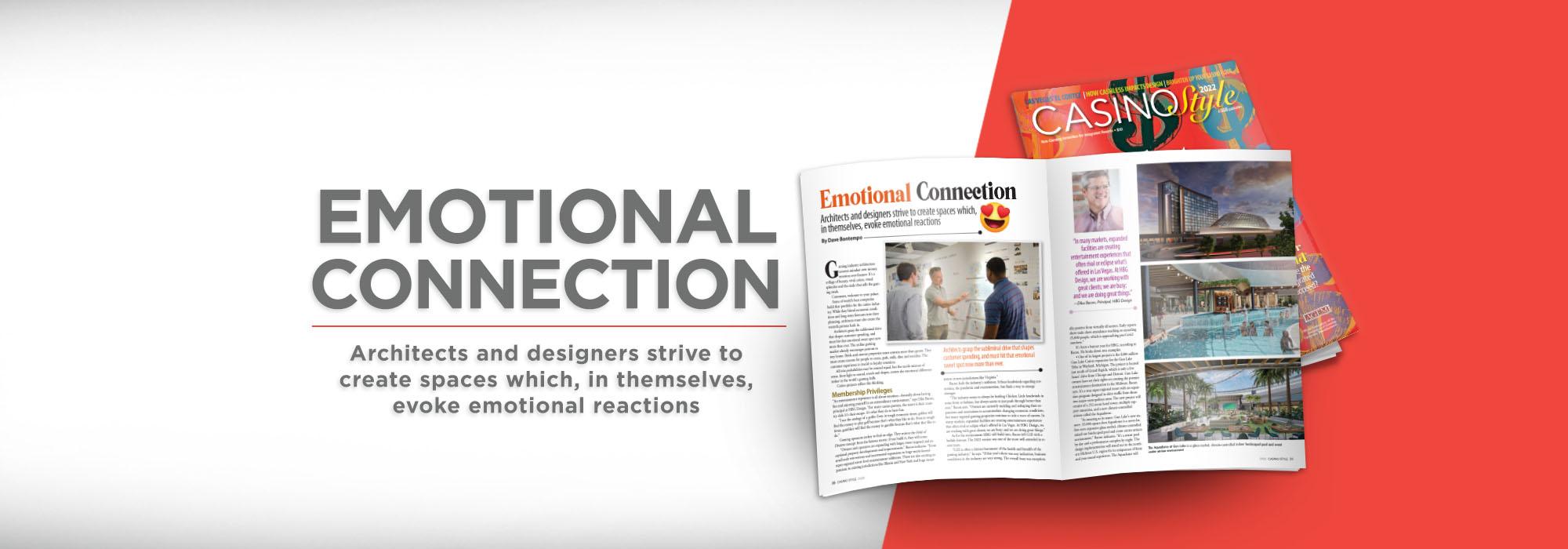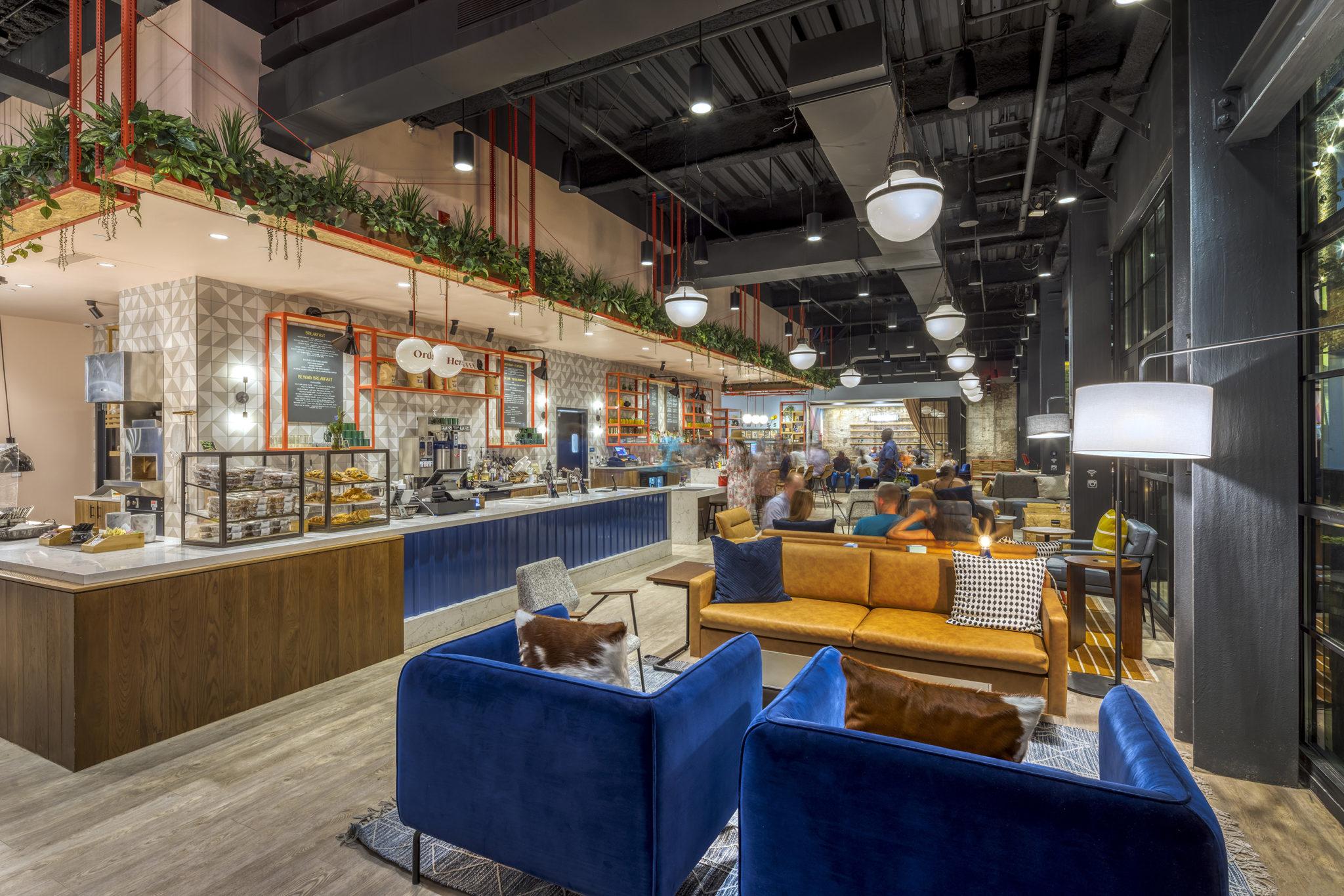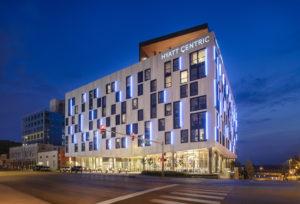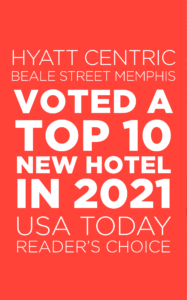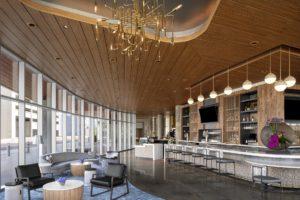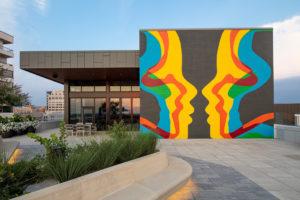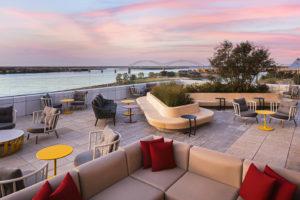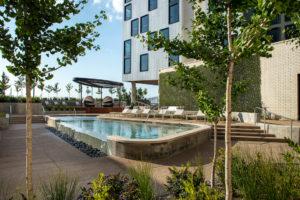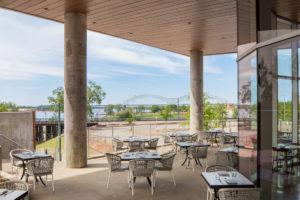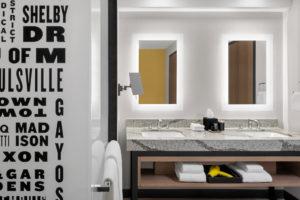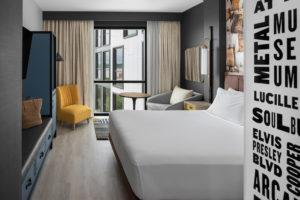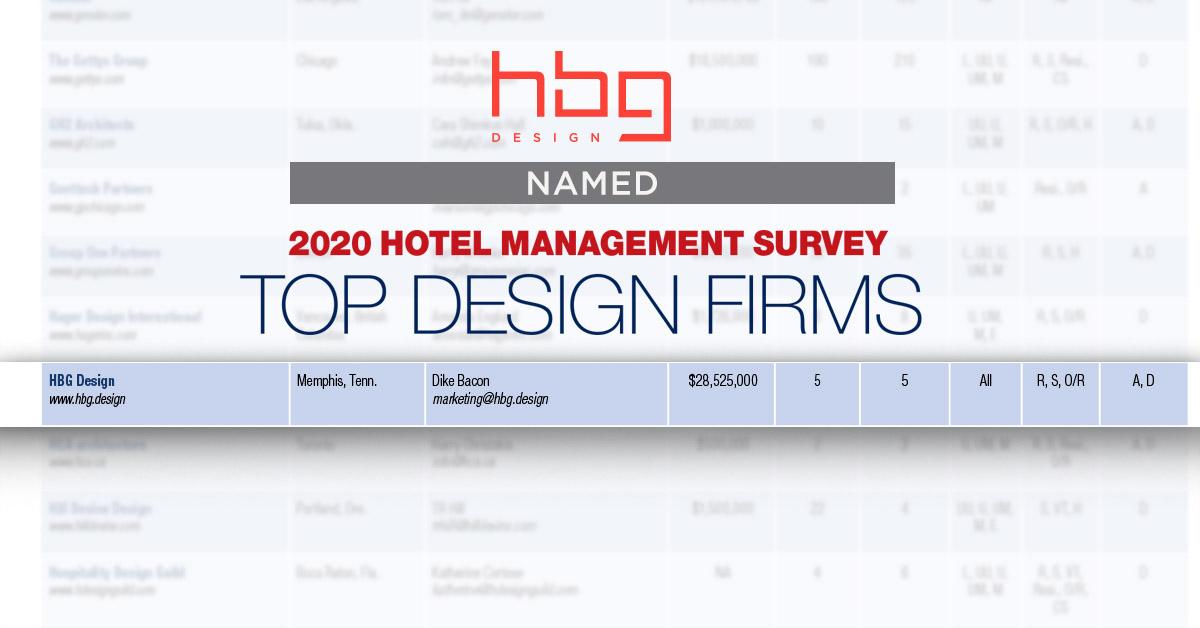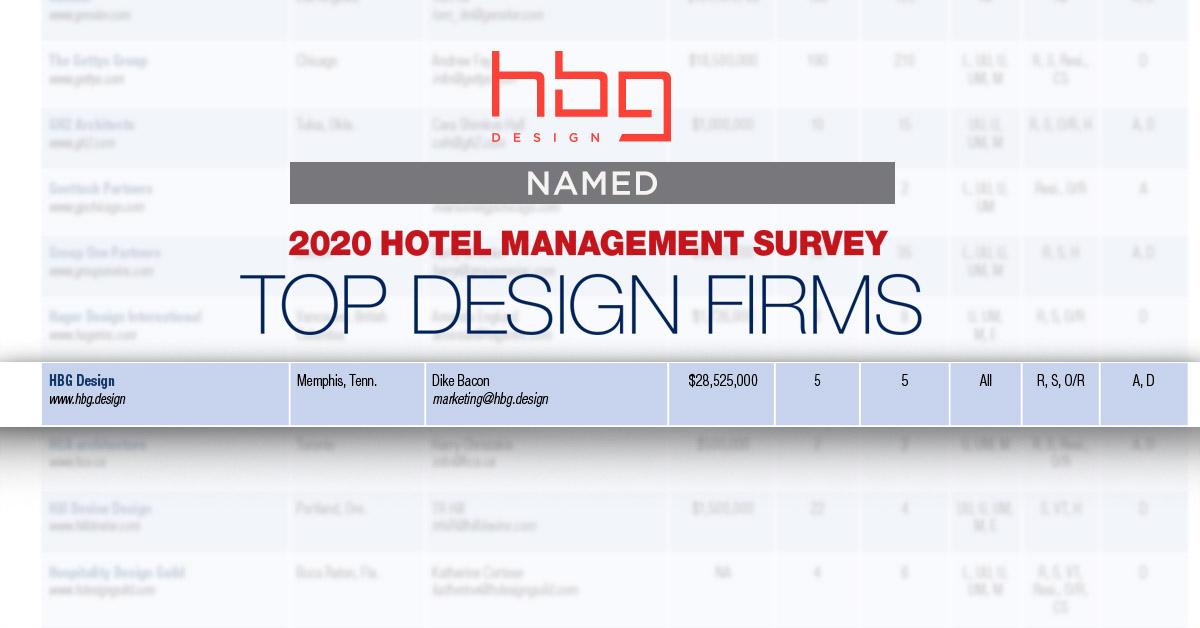HBG Designers Select Their Pick of the Trends
HBG Design is on the forefront of the latest ideas in 2023 hospitality and entertainment design. Read our lead designers’ pick of the trends for the year ahead.
HBG ‘Design Thinking’ Contributors:
- Emily Marshall, IIDA, NCIDQ, Principal / Interior Design Director
- Alexandra Milkovich, IIDA, NCIDQ, Associate / Lead Interior Designer
- Landon Shockey, IIDA, NCIDQ, Lead Interior Designer
- Thor Harland. Lead Architectural Designer
Focusing Capital Budgets on Distinctive Amenities and Unexpected Experiences to Attract a Wider Market
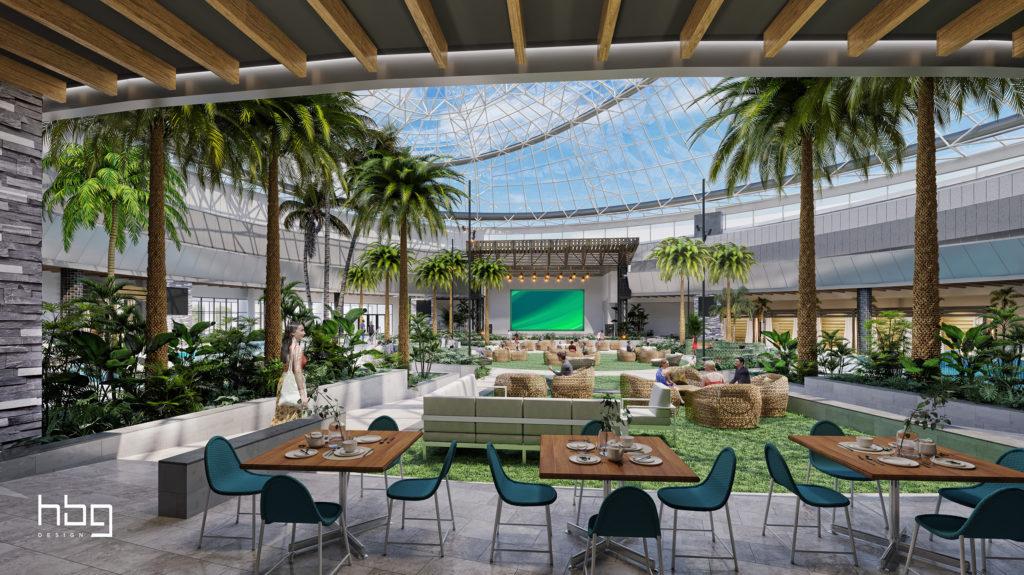
Competition in most markets will continue to be intense in 2023. Properties large and small across the U.S. are elevating competitive advantage by renovating and expanding new market-driven, revenue-generating amenities. Many of our resort clients are betting BIG on unique features to bring in a new untapped customer base from greater distances. “For Gun Lake Casino Resort in Wayland, Michigan, that ‘wow’ factor is a large multi-purpose pool and events complex. The new six-story, 32,000 SF architectural marvel is set to be an oasis for ‘superregional’ customers in Chicago and Detroit looking to escape those harsh Midwest winters,” says Thor Harland. “With a year-round temperature of 82 degrees, The complex is a never-before-seen expansive, mixed-use environment, completely climate-controlled under a stunning glass roof. At its heart are terraced, landscaped pools that transform into a one-of-a-kind event center within the atrium environment. A resort pool by day and a performance complex by night, the concept includes three distinct pools, a swim-up bar, live palm trees and tropical flora, and a large entertainment stage that can host events for up to 2,400 people.”
“We always work closely with our clients and their operations teams to keep project costs down,” says Emily Marshall, IIDA, NCIDQ. “By identifying and eliminating superfluous or unnecessary square footage, we help Owners focus their design budgets on those eye popping, revenue-generating amenities that create visual and experiential distinction in their markets.”
Multi-Functional Hotel Lobbies and Centralized F&B
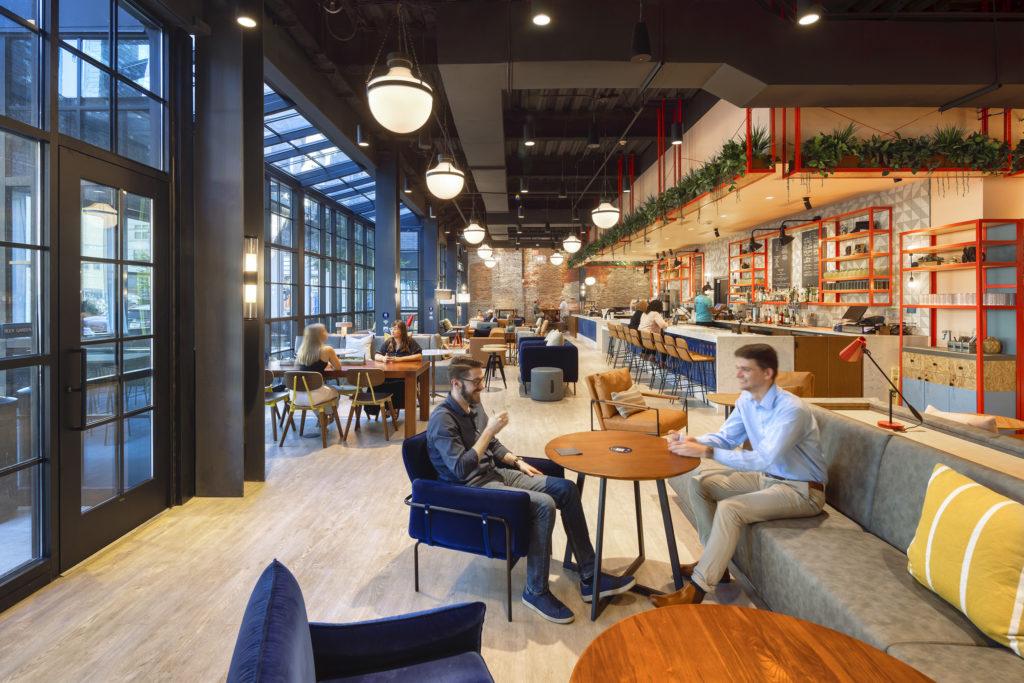
Gone are the days of guests zipping through the lobby as a passageway to other destinations. The new hotel lobby beckons you to sit and stay a while. “Furthering the residential trend that has taken off in the hospitality space, lobbies are appearing more like a comfortable living room – offering a place to eat, drink, work, and play,” says Marshall. The new lobby lounge coined ‘Talk Shop' at Caption by Hyatt Beale Street Memphis reimagines the guest arrival experience with a lively multi-functional welcome area, all-day lounge and workspace, coffee shop, eatery, grab-and-go artisanal market and cocktail bar. “Energy reverberates throughout the colorful space, which was designed to encourage social interaction inside and outside at the adjoining beer garden courtyard,” she adds. Similarly, the adjacent Hyatt Centric Beale Street Hotel’s lobby offers a variety of amenities to suit visitors, locals and remote workers alike, including a large lobby bar and lounge, a communal worktable with integrated outlets and charging stations, a convenient grab and go market, and high-profile dining venue.
“We are also leading changes in F&B design that improves operational efficiency, as a direct outgrowth of the industry’s ongoing staffing shortages,” says Marshall. She explains that menus and food selections may be branded around an experience, but online ordering and room service / delivery / locational pickup means that food preparation no longer needs to be in separate kitchens attached to individual venues.
“Another good example is a property like Resorts World in Las Vegas where food and beverage operations are streamlined by creating centralized, shared hub and spoke type kitchens that service all dining venues on property.” There are many diverse solutions; it all comes down to creating efficiency and functionality that produces high quality with reduced resources.”
Dark, Dramatic, Statement-Making Design
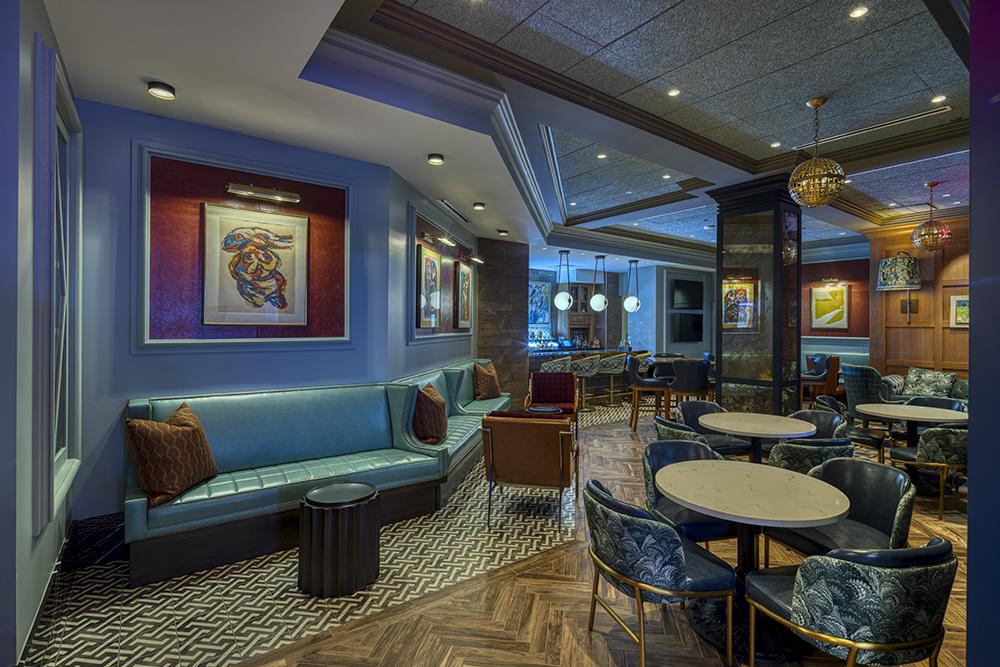
“We are taking bright colors like coral, violet or turquoise and deepening their tonality to create more subdued, rich, darker shades that are visually interesting and restorative,” says Landon Shockey, IIDA, NCIDQ.
The simplicity of white interiors and a minimalist palette is always in style, yet as casino resort designers we LOVE that deep, moody colors are back. One example: The Oak Room at Oaklawn Racing Casino Resort in Hot Springs, Arkansas–a perfect blending of contemporary and traditional design–features an early 1900s era aesthetic reminiscent of a dimly lit, moody speakeasy. The noted F&B venue mixes deep, luxe tones and geometric patterns with brilliantly colored, stunningly energetic LeRoy Neiman original paintings as a playful contrast in the eclectic eatery. Globe pendants, tufted leather banquettes, and custom oak detailing finish the look while transporting guests to a different era.
“Complementing inky hues, we’re blending rich textures like leather, velvet, natural stones, and a variety of woodwork that adds depth and softness which is irresistibly cozy and welcoming,” adds Alexandra Milkovich, IIDA, NCIDQ.
Continued Alignment of Sustainability and Design
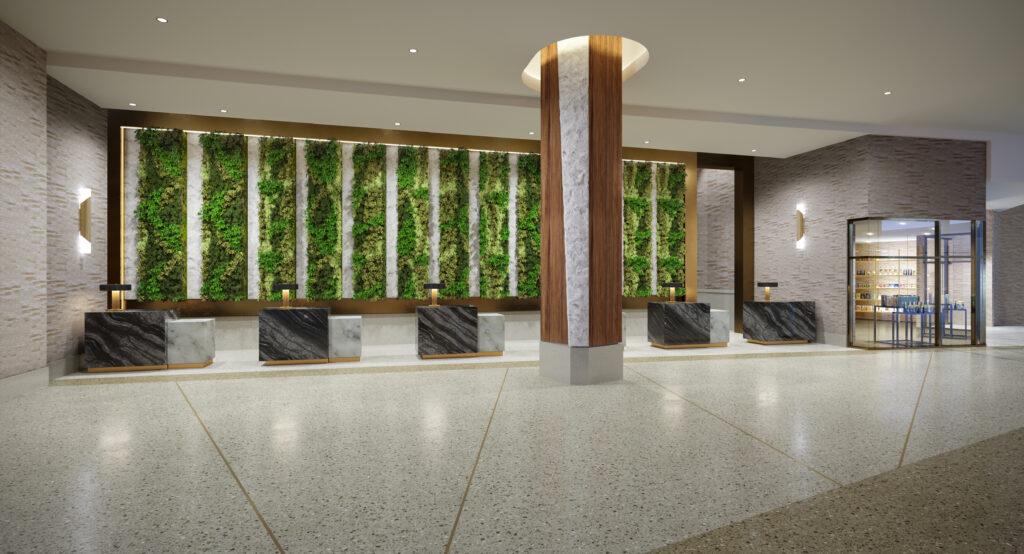
Sustainability is taking center stage these days and major hospitality brands like Hilton, Hyatt, Starwood and Marriott are committing to significantly reducing their environmental footprint in the coming years and focusing on wellness as a key benefit for guests.
“HBG Design is actively aligning our design concepts and interior selections to help clients down this path,” says Milkovich. “Our teams have prioritized sustainable materials in our interiors library and are training designers to select materials for their durability and ease of maintenance and to extend the duration between property refreshes/renovations.”
"Durability leads to a longer lifecycle, especially for furnishings; and the lifetime of a product is something that is extremely important to not only the environment, but also to our client’s bottom line,” adds Milkovich. “For instance, instead of using an exotic wood species such as Mahogany or Walnut that may be overharvested, we would specify Eucalyptus, which is a more renewable species and sustainably sourced. Today’s products made from Eucalyptus can often mimic the appearance of a rarer wood.”
Design That Supports Guest Wellness and Well-Being
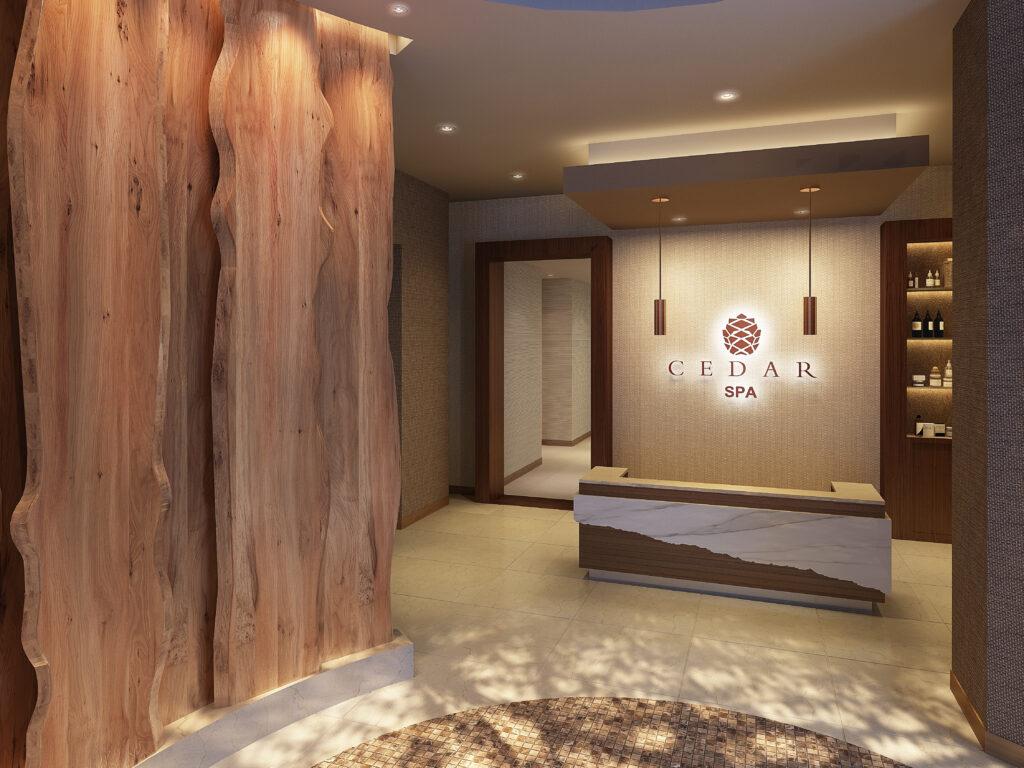
Many of our clients are excited to promote wellness, mindfulness and health benefits among their guests, making spas within the resort environment even more popular today.
“Reduction of stress and increased well-being and healing are some of the overall benefits of biophilic design through the infusion of natural and nature-inspired materials into the built environment,” says Marshall.
The new Cedar Spa at Four Winds Casino Resort in South Bend, Indiana, is a great example of how the demand for wellness is being incorporated into gaming resort properties. At Four Winds, the resort’s signature design elements of copper, cedar, birchwood and stone--each representing significant cultural elements of the Owner’s heritage--are integrated throughout the spa, holistically adding to the wellness experience. Located on the first level of the new 23-story, 317-room hotel tower, The Cedar Spa provides a variety of traditional and unique spa therapies, including steam rooms, saunas, vitality pools and separate lounges for women and men.
“The transition from the high energy zone of the gaming floor to the relaxation zone of the spa is highlighted by an illuminated feature that appears as sunlight shining through a canopy of cedar trees,” adds Marshall. “This simulation was created through ornate copper ceiling elements allowing pockets of light to peek through, creating dancing shadows around the spa entry.”
GGB Casino Style Magazine: Designing Emotional Connection
Read how HBG is designing emotional connection into three of our new casino resort projects.
“An entertainment experience is all about emotion—basically about having fun and enjoying yourself in an extraordinary environment,” says Dike Bacon, principal at HBG Design. “For many casino patrons, the resort is their country club. It’s their escape. It’s what they do to have fun.
“I use the analogy of a golfer. Even in tough economic times, golfers will find the money to play golf because that’s what they like to do. Even in tough times, gamblers will find the money to gamble because that’s what they like to do.”
Gaming operators jockey to find an edge. They mirror the Field of Dreams concept from the famous movie: if you build it, they will come.
“Owners and operators are expanding with larger, more targeted and exceptional property developments and improvements,” Bacon indicates. “From small-scale renovations and incremental expansions to huge multi-faceted super-regional resort-level entertainment additions. There are also exciting expansions to existing jurisdictions like Illinois and New York and huge investments in new jurisdictions like Virginia.”
Bacon hails the industry’s resilience. It faces headwinds regarding economics, the pandemic and oversaturation, but finds a way to emerge stronger.
“The industry seems to always be battling Chicken Little headwinds in some form or fashion, but always seems to just push through better than ever,” Bacon says.
“Owners are currently molding and reshaping their expansions and renovations to accommodate changing economic conditions, but many regional gaming properties continue to ride a wave of success. In many markets, expanded facilities are creating entertainment experiences that often rival or eclipse what’s offered in Las Vegas. At HBG Design, we are working with great clients; we are busy; and we are doing great things.”
READ MORE IN GLOBAL GAMING BUSINESS' 2022 CASINO STYLE MAGAZINE
Designing Emotional Connection
Gun Lake Casino Resort, Wayland, Michigan
One of HBG Design's largest projects is the $300 million Gun Lake Casino expansion for the Gun Lake Tribe in Wayland, Michigan. The project is located just south of Grand Rapids, which is only a few hours’ drive from Chicago and Detroit. Gun Lake owners have set their sights on creating the premier entertainment destination in the Midwest, Bacon says. It’s a true super-regional resort with an expansion program designed to drive traffic from those two major metropolitan areas. The new project will consist of a 252-room hotel tower, multiple support amenities, and a new climate-controlled atrium pool and events complex.
Rock & Brews Casino, Braman, Oklahoma
The first-ever HBG-designed Rock & Brews Casino and Restaurant owned by Kaw Gaming opened for business in Braman, Oklahoma this year. Co-branding with recognizable names from outside the casino industry to anchor key amenities is not a new concept, but is gaining more traction with tribally owned casinos as a means to broaden market appeal and greater name recognition from an expanding customer base, Bacon says. The 71,000-square-foot gaming project features an expertly curated interactive rock-inspired entertainment experience that only Rock & Brews—and its co-founders Paul Stanley and Gene Simmons of iconic rock band KISS—can provide. The Rock & Brews brand and venues are noted for using heavy integration of rock ‘n’ roll imagery and iconography to elicit emotion and nostalgia in customers.
HBG Debuts the Caption by Hyatt Brand
Introducing Caption by Hyatt Beale Street Memphis:
The First Caption Branded Hotel Built in the World!
Not just in the community, but of the community.
That is Caption by Hyatt’s design promise. The first ever built Caption by Hyatt branded hotel--designed by HBG Design and built in Memphis, Tennessee--fully delivers. The upscale, select-service lifestyle brand introduces a dynamic hospitality experience with an unmistakable neighborhood feel.
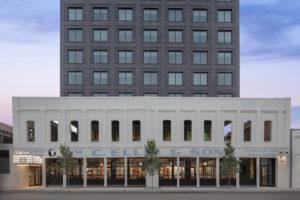
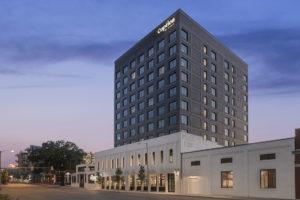
The hotel is housed distinctively within the two-story historic façade of the William C. Ellis & Sons Ironworks and Machine Shop building in downtown Memphis. With its original stenciled building signage intact, the historic Ellis Building was repurposed for the Caption's unique storefront beer garden and first two levels. It also creates the event, conference and meeting space shared by the Caption and the adjacent Hyatt Centric, Built in 1878, this former blacksmith shop was one of the earliest, longest-running businesses in Memphis. It made wrought-iron straps for carriages and shoes for horses and mules and was later used as an agricultural machinery repair shop.
A new 136-room hotel tower rises above, offering guests endless views of the Memphis skyline and the Mississippi River.
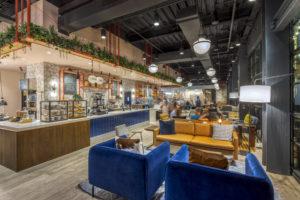
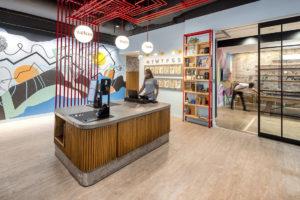
The heart of Caption by Hyatt Beale Street Memphis is ‘Talk Shop’, the brand’s reimagined arrival experience. Here, guests enjoy a lively multi-functional welcome area, all-day lounge and workspace. It features a coffee shop, eatery, grab-and-go artisanal market and cocktail bar. Energy reverberates throughout the colorful space, which was designed to encourage social interaction. It is a place to eat, drink, and connect – inside, and outside at the adjoining beer garden courtyard.
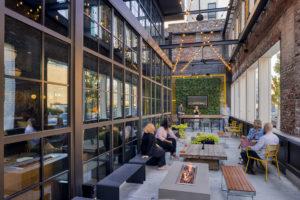
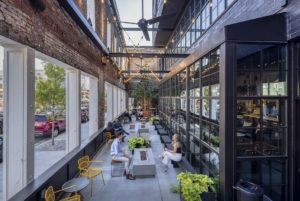
The beer garden is an expansive patio is open to the street’s pedestrian walkway. The space is uniquely integrated within the building’s historic façade and allows guests to fully engage with the active downtown neighborhood.
Click to Read More About the Project
HBG planners and designers created a strong sense of place and a distinct ‘localvore’ urban experience for the Caption by Hyatt and the adjacent Hyatt Centric by drawing conceptual inspiration from Memphis’ rich riverfront industrial history found in the Ellis machine shop buildings, the city’s world-famous musical roots, and the city’s distinct ‘grit and grind’ attitude.
HBG's Five Trends for Transforming Hospitality Design in 2022
The pandemic has redefined hospitality design, but the reason why guests come together to share experiences hasn’t changed. It's more critical than ever to apply thoughtful, flexible and wellness-focused design sensibilities to hotel spaces, guestrooms and amenities. HBG Design Leaders Nathan Peak, AIA, LEED GA, Practice Leader, and Emily Marshall, IIDA, NCIDQ, Interior Design Director, present five trend ideas for transforming hospitality design into 2022.
Multi-Functionality and Spatial Flexibility
Greater work flexibility has resulted in an increase of blended leisure and work travelers. We see a fresh reframing of hotel “zones” into residential-like multifunctional “work / dine / gather” spaces that easily align with evolving travel needs.
“The lines between work, travel, living and leisure are now blurred, which is a clear outcome of the pandemic.” - Emily Marshall
Many of HBG Design’s hotel and resort clients have re-prioritized their amenity offerings to provide an optimum alternative work environment for the “blended traveler”. To accommodate the blurring lines between work, travel, living and leisure, hotel lobby and public spaces are being designed in zones that easily shift from quiet virtual workspaces with auditory privacy to collaboration hubs for business interaction, to social areas depending on the needs of operators and their guests. The wide-open space idea is the foundational element, giving hotel operators the ability to blur the purpose of the space itself, based on the needs and wants of their guests. In fact, the in-room, remote work experience has – in many cases – become as important as delivering exceptional, traditional resort amenities, and that trend shows no immediate slow-down.
At Hyatt Centric Beale Street Memphis and Canopy by Hilton Memphis, both designed by HBG Design, we created residential inspired co-working zones with the idea of adaptable, flexible and technologically connected public spaces.
Experiential Design for Aspirational Travelers
Travelers are “breaking free” after months of pandemic isolation in some cases. Aspirational travelers are in search of memorable experiences and shareable moments inspired by art, architecture, design, history, and unique locales.
Hotels must offer new and creative experiences for guests in order to compete with the myriad of accommodation options in the marketplace, such as VRBO and SONDER. Local and regional materials, local artisans and custom design will all play a vital role in expressing authenticity in unique and artful ways, as designers seek to achieve an aesthetic that is “of the area” and create experiential moments.
At the Hyatt Centric Beale Street Memphis, HBG designers created a strong sense of place and a distinct ‘localvore’ Centric brand experience by drawing conceptual inspiration from Memphis’ rich music and riverfront industrial history. The contemporary hotel's staggered patterning of the window placement recalls sheet music and guitar fret patterns accentuated at night with bars of light to provide a musically inspired programmable light show. The Beck and Call rooftop whiskey bar features several selfie-worthy design opportunities like a colorful rooftop mural, the best river view in the city, and portraits of famed musicians with Memphis ties, including Tina Turner, Justin Timberlake, Isaac Hayes, Valerie June, and Yo Gotti.
Restoration Through Nature
To enhance mental well-being, guests will seek out serene environments that offer respite and natural context that blurs the lines between indoors and outdoors. We anticipate an elevated demand for wellness-related amenities.
“The pandemic highlighted our need, as humans, to interact with nature.” - Nathan Peak
Humanity is hard-wired to seek physical and emotional connection with nature to feel healthier and more energized. It’s about creating a relationship between the interior and exterior that enhances guest responses to environmental stimuli and creates sensory experiences. Biophilic design methods underscore how a guest feels in a given space, which contributes significantly to experiential design. Bringing the outdoors inside through light, open design and integration of natural elements creates a feeling of restoration, wellbeing and happiness where guests respond positively --- a result every property seeks to achieve.
The architecture and shaping of the Hyatt Centric Beale Street Memphis lobby space creates beautifully framed views of the Mississippi River while dappling the public spaces with ample sunlight and reflections from the constant movement of the mighty river beyond. Outdoor Riverview dining and a landscaped pool and event courtyard “oasis”, complete with green lawn and a green wall, create a distinctive respite in the downtown core.
Guestroom Technology
Automatic technology will continue to advance the curated and customized guestroom experience offering options for convenience and comfort.
There are times when the greatest luxury in travel is knowing you’ll have no surprises upon arrival. Everything you want, exactly how you want it can be ordered and confirmed for your stay, before you ever walk through the hotel entrance. Not only can you check-in to your hotel room virtually, but you can select your room size, floor, view, accessibility to amenities, upgrades, etc. Access to no-contact services and experiences aren’t reserved for check-in; literally everything a guest wants or needs can be delivered directly to the guest room, and often by simply using voice commands from the comfort of your room. From voice-activated concierge services to voice or motion control of lighting, audio-visual systems, and room temperature, automation is proving to elevate convenience for the guest and permeating all aspects of the hotel experience.
"Within the room, I am especially fond of the motion detecting floor lighting technology designed into the beds in our Hyatt Centric Beale Street project. Gone are the trappings of navigating an unfamiliar room in the middle of the night; the integrated technology in our bed design creates a soft glow of light in the room as soon as your foot hits the ground." - Emily Marshall
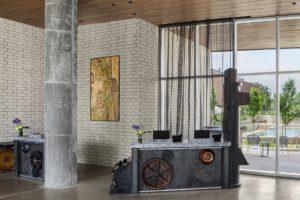
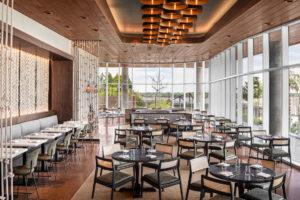
Regional and Early Material Sourcing
Material shortages, higher costs and longer-lead times are straining hotel project schedules. Regionally sourced materials will help overcome supply chain demand challenges. Procurement in the early design phases will help ensure construction availability.
“Carefully sourced regional options can not only circumvent such transportation and tariff issues, but they can also promote greater connection to place in meaningful ways.” - Emily Marshall
Many of these issues the industry is experiencing can be navigated during the early design phases with the right guidance from a knowledgeable team who understands the inner workings of available products and materials. Interestingly, we are seeing a stronger focus on the specification of domestic made products, which is good for the economy at large. The engagement of an experienced designer, construction company, FF&E procurement agents, and vendors early in the design process is critical, as products and materials quantities require early confirmation and additional lead time in ordering.
One way HBG Design is working around the supply chain situation is by using more regional manufacturers who employ skilled tradesmen who build case goods and millwork in a shop, versus working onsite. This not only keeps the level of quality high, but also increases efficiency of labor.
"HBG Design is looking at everything from design to delivery through a different lens heading into 2022, while reimagining the way spaces are used, designed, and furnished. And that, in the long run, will be better for everyone." - Nathan Peak


